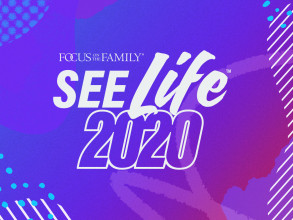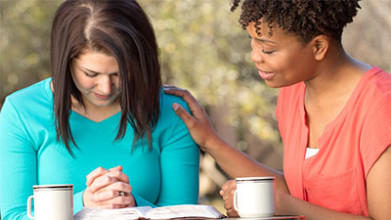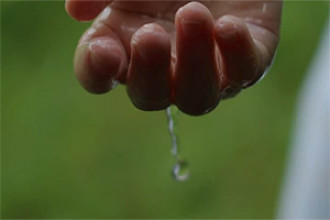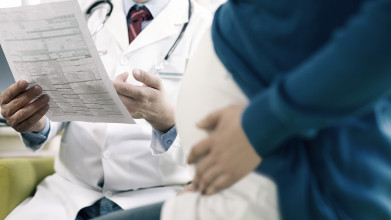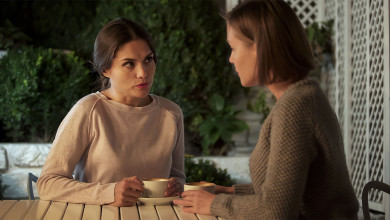Excerpt:
Sarah Williams: She was the greatest gift God ever gave because through loving her, God showed me His own heart. And so the thing was, it wasn’t about doing something grand or brave or moral. She was God’s gift to us because she taught us how to love somebody who needs our love.
End of Excerpt
John Fuller: Sarah Williams joins us today on Focus on the Family. Your host is Focus president and author, Jim Daly. And I’m John Fuller.
Jim Daly: Here at Focus on the Family, we hear so many wonderful stories from marriages that are saved, to relationships between parents and their children being redeemed, to orphan kids finding forever homes. Some of my favorite stories, though, center around the pre-born child. And here at Focus for over 40 years we have been staunchly pro-life and certainly over the last year and a half with the different programs we have here at Focus, we have been re-stating our position as a pro-life organization.
John: It seems that’s really important in today’s culture, Jim, and the door is open for people to hear that message.
Jim: Right. It’s one reason we celebrated Alive from New York back in May 2019. And what a great event that was. As we’ve mentioned before, the star of the show was a 4-D ultrasound of a third-trimester baby. And I’ll never forget what I would call that “holy hush” over that crowd. You remember that?
John: I do. It was – it was just awesome.
Jim: And while we had about 20,000 pro-life folks there in Times Square for that event, there were also about 300 protesters. And when that baby came on the screen and you could hear the heartbeat, it was breathtaking. And I watched the faces of the protesters. That’s where my eyes went, and they were riveted. The 4D image clearly showed the baby in the womb. And it was so powerful. And so, we’ve re-energized that effort with a free, online event called See Life 2020. And this is happening on September 26th and it’s going to transform hearts and minds on the issue of abortion, I do believe. The program will feature powerful pro-life stories, soul-stirring music and it will culminate with a 4D ultrasound of a baby offering a window into the reality of life in the womb. And you won’t want to miss it.
John: All the details about See Life 2020 on September the 26th are at focusonthefamily.com/broadcast.
Jim: And, John, the story we have today really lines up with this passion for life. We want to share the heart of a loving mom who made the brave choice to refuse the doctor’s suggestion of abortion when her baby received an adverse diagnosis in the womb. It’s a compelling and captivating look at the dignity of human life.
John: Sarah Williams is a gifted teacher, writer and communicator and is a research professor at Regent College and a research associate at the University of Oxford. She and her husband, Paul, have two adult daughters. Sarah’s captured her beautiful story in the book titled Perfectly Human: Nine Months with Cerian. And we do have copies of that at our website.
Jim: Sarah, welcome to Focus on the Family.
Sarah: Thank you. It’s good to be here.
Jim: Now you’re currently residing there in the U.K., correct?
Sarah: That’s right.
Jim: But you were able to make a visit. You were in New York and now out here in Colorado. Thanks for coming.
Sarah: Thank you.
Jim: Yeah, we really appreciate it. Share with us a little about you and Paul. How’d you come together as a couple? How long have you been married? And at that point in the early days what were your dreams about family?
Sarah: We got married in 1988.
Jim: All right.
Sarah: And, uh, we were both students together. And we had lots of dreams. We got married while we were still students, which raised a few eyebrows, and, uh…
Jim: Yeah.
Sarah: And, uh, yeah, it was good. We always hoped we’d have quite a big family. I’m one of six. And Paul has a couple of brothers. He’s one of three. And I guess we always thought that we’d have maybe four kids.
Jim: (Laughter).
Sarah: Isn’t it great to make plans? Then you can laugh about them 30 years later. (Laughter)
Jim: It’s funny. I think about that now. And Jean and I, you know, we had our plans, too, and I’m sure you and Dena.
John: We did.
Jim: It’s just so funny how you start thinking about that. And then it’s, “Well, let’s wait a little while.” And then – and then something happens, and the Lord says, “No, it’s going to be now.” And in your case, it was new. You had kids – children rather quickly.
Sarah: Yeah.
Jim: Speak about your two daughters. Give us their names and a little bit about them.
Sarah: We have two daughters, Hannah and Emilia. And at the time, the events that I write about in the book, Hannah was 8 and Emilia was 5. And we had hoped for another baby quite quickly.
Jim: Right.
Sarah: But in fact, after Emilia was born, I had really significant problems with my back.
Jim: Right, speak to that. Emilia was a difficult pregnancy. What on the, you know, kind of the high-level view – what took place? And what were your concerns moving forward for both you and Paul?
Sarah: Just real significant worry that, um, my back was so painful that actually things that are joyful about having little children, like playing on the floor and picking them up and putting them to bed, were very painful. And, um, so it was a long while of doing lots of exercises and praying and hoping and dreaming still before we actually became pregnant with our third daughter.
Jim: How much time had passed between Emilia’s birth and getting pregnant with your third daughter?
Sarah: Five years.
Jim: Five years.
Sarah: Yes, and that felt like a long time, actually.
Jim: Right, and, you know, that is a bit of distance between the two, but you were trying to recuperate, physically get stronger, I would imagine.
Sarah: Yeah, that’s right.
Jim: Yeah. So, you prayed about having a third child. And how did God answer that prayer? And how did that third pregnancy start out for you?
Sarah: We were so excited.
Jim: Yeah.
Sarah: And so were the girls. And it started out with this great surge of excitement and hope. And then I started being sick. And I had really severe hyperemesis where you can’t stop being sick.
Jim: So, it’s not your typical morning sickness. This was more severe.
Sarah: Well, it’s sort of 13, 14 times a day and then having to go into hospital to have be intravenously rehydrated.
Jim: Yes.
Sarah: So, it was difficult. But they did a really early scan, thinking, “Is there something wrong?” Nothing showed up. They even wondered, “Is she having twins?” – because apparently, that can make you more sick, too. But nothing showed up. But it was quite grim. But even in the grim, we were still excited…
Jim: Sure.
Sarah: …And we kept thinking, “This will all be worth it soon.”
Jim: Sure, and moving along and then you had that 20-week scan.
Sarah: Yeah.
Jim: I’m assuming an ultrasound or some kind of test.
Sarah: Yeah.
Jim: And then that original concern or a concern appeared. What happened?
Sarah: Yeah, we went – in – in the U.K., where I live, every woman has a 20-week – a regular scan. And it’s a screening scan in order to identify any problems, fetal abnormalities and so on. So, I went for the regular scan. And it was a really busy day. It was Hannah’s birthday, our 8-year-old.
Jim: Okay. That’s your 8-year-old.
Sarah: Yes. And I had been teaching tutorials at the University of Oxford all morning, and I was really busy. And I just fitted the scan in on my way home to get the birthday cake ready, everything ready for Hannah coming home – plans. We make plans (laughter).
Jim: So, really – right, and so for you it was just this routine thing, and you weren’t…
Sarah: It was very – I’m not really sentimental about scans. I sort of have mixed feelings about them. Paul didn’t even come. He was on the train on his way home from London. So, I was totally unprepared.
Jim: And what did it show?
Sarah: The nurse put her hand on her arm, said, “There’s something wrong with the baby.” And it showed that the baby had a lethal skeletal dysplasia, a malformity of the skeletal structure called thanatophoric dysplasia, where the bones don’t develop sufficiently to allow the proper development of the lungs. So, she was okay inside the womb, but she was not expected to live much – like, she would die either at birth or shortly after birth.
Jim: You know, so often, Sarah, a woman, particularly, but her husband, too – in that moment, those are very difficult words to hear from a doctor. “There’s a problem. There’s a severe problem.” How did you process that, you know, especially as you self-described as somebody who’s not, you know, necessarily emotional about these things? But to hear those words that “we see a severe problem with your child,” what was that immediate reaction like?
Sarah: The very first reaction was, “They’ve got me muddled up. They’ve got the scan muddled up with somebody else’s body.”
Jim: Right, it’s their problem.
Sarah: Because I could see the baby on the screen. And then you were describing what it’s like to watch a baby in an ultrasound, and I’m sitting there seeing the baby moving. I can’t read an ultrasound. And I’m thinking, “This can’t be right.” So, the immediate response was just – just disbelief. And I remember sitting there feeling that cold all over, thinking, “How can this be?” And I was still in that place of really deep shock, I think, when we moved to a side room away from the scanning room to have a meeting with a second consultant who started to talk to me about having a termination within an hour.
Jim: Right.
Sarah: And I was still trying to say thanatophoric dysplasia over and over again so I won’t forget the word because I knew Paul would ask me. And I needed to remember. And then I’m trying to take in a decision. And they’re talking about coming back in the morning to tell them what we had decided to do. And I couldn’t quite comprehend that I was being told about a termination. I remember sort of saying, “Well, what would be involved in a termination?”
Jim: Right.
Sarah: Because I’ve grown up in a Christian environment, Christian family. I became Christian when I was 4. And I’ve always thought about abortion as something that affects somebody else. So, I don’t even really know what was involved in a termination. And I remember sitting there with all the shock and the layers of shock suddenly having to take in that what was being recommended in this situation was, the best medical option here was to terminate the life of our baby.
Jim: I can only imagine that – um, getting home that night and having to talk face-to-face – not just over the phone, but face-to-face with your husband, Paul, and you trying to figure out – what do we do? I mean, do we trust God? Do we trust the doctors? Do we, um, stand on the things that we believe in and not terminate the baby? Do we terminate the baby? Which is best? Is there any health risk for me? All those questions you and Paul are trying to go through.
Sarah: Yeah.
Jim: What was that like – spiritually speaking. What was that like to wonder, “God, where are You in this? How come this is happening to us?” You know, “Lord, if we’ve done a fair job living our lives, why are we suffering in this way?”
Sarah: Yeah, and all those thoughts that you’ve just articulated were going through my mind as I’m making Hannah’s birthday cake.
Jim: Right.
Sarah: ‘Cause it’s her birthday, and my mind is her birthday. And we – Paul said to me on the phone, “This is Hannah’s birthday. And we don’t want for the rest of her life the memory that this was the day we heard this news.”
Jim: Boy, that was wise advice.
Sarah: So, we went through her birthday tea – just these thoughts going on, the confusion, Paul and I looking at each other, but we didn’t have time to be alone and praying for the grace of God to get to that moment. Got the girls to bed and we went down to our lounge. And we sat down on our old green sofa, and we just did not know. We were just desperate. And I was shocked because the one thing I didn’t anticipate was – my first instinct was, “I just want this to be over. I just want them to get this fetus out of my body as quickly as possible. This is a medical situation and it demands a medical fix, so a medical response.” And this kind of distance mechanism was kicking in for me where I was thinking, “Yeah, I’ve got these principles, but this is not a normal situation. We’re not talking about a normal baby” – what a weird phrase. And I’m just thinking, “I don’t…” And Paul, in the midst of that, said, “We’re going to pray.” But I didn’t want to pray because I – I knew that being praying and praying involved being still, and I didn’t want to be still. I just wanted it to be over.
Jim: That is a profound statement because it speaks to the broader issue of abortion, I think, when a woman doesn’t know what to do or has fear.
Sarah: That’s right.
Jim: It’s this instinct, like you said, this feeling. “Let’s just get rid of it. Let’s just take care of it.”
Sarah: “Just – just get me out of this situation. I can’t cope with it.” Yeah.
Jim: And I appreciate the honesty of that. I mean, that’s a reasonable thought, I believe – um, reasonable in the human context…
Sarah Yeah.
Jim: …To say that and have that response. And, you know, “We could do this, and then it’ll be over with, and then we can carry on, Paul. We can have tomorrow. And we can try again.”
Sarah: And I was so sick, and my back hurt so much. And I thought, “How can I go through the next part of the pregnancy without any hope?” And that shocked me because I realized that the principles that I had were not enough to carry me through the pregnancy.
Jim: Now, for those that are listening, going, “What are you saying, you guys?,” now talk about the spiritual aspect kicking in. You’ve had this feeling of let’s – “This is medical. This fits within the framework of my faith. God, I do not believe, will judge me for this, given the fact that the baby’s not going to live,” all the rationalization that actually is quite right. How did you and Paul then begin to say, “Well, wait a minute, let’s do it differently. Let’s trust God”?
Sarah: Well, it didn’t happen quite like that. So, we were desperate. And we were on our sofa with all these intense emotions. And we just cried out to God. We didn’t even have proper language of prayer. Just, “God…”
Jim: Agony.
Sarah: “…Help. We don’t know what to do.”
Jim: Yeah.
Sarah: And an extraordinary thing happened to us sitting there on our green sofa, where in our culture, you sometimes hear people say, “And we felt God say to us,” and I have no idea what they mean by that phrase until that night, when I can only describe it as a deep sense that God was sitting on that sofa with us in our despair. And He was saying, “Here is a sick and dying child. Will you love her for Me and take care of her until she dies?” And that changed everything because it was suddenly not about a choice that we had to make or a rule or a principle or a decision. It was about God’s love. And it wasn’t so much about our capacity to deal with this terrible situation, but about God’s love for this tiny, vulnerable human being that the hospital didn’t even think of as a human being.
Jim: Right.
Sarah: And in those moments, I didn’t. What I felt was, “She’s an impediment.”
Jim: Yeah.
Sarah: But God’s love – and it changed everything. It changed the way we saw the situation we were in…
Jim: Yes.
Sarah: …That it was about Him and His love. And He had radically entrusted this profoundly vulnerable person to us, who didn’t even have the instincts that were good and right.
Jim: Right. You know, it’s powerful. You know, what I love about what you’re saying is the fact that, hearing God’s heart in that, that God loves us – each one of us, whether you’re in the womb of your mother or you’re an 85-year-old person who’s gasping for life, everything in between, too – that’s God’s love for us. That’s what catches me with your story because we would think of God – some of us, and I would say me, too – “It’s rational, Lord. You know the hardship that’s going on here. Let’s just get this over with. It’s medically appropriate. The baby’s not going to live.” But for the Creator of the universe to step in…
Sarah: Exactly.
Jim: …And say, “No, show this created being – created in My image – show this little child My love.” And what did that mean to you?
Sarah: She was the greatest gift God ever gave because through loving her, God showed me His own heart. And so the thing was, it wasn’t about doing something grand or brave or moral. She was God’s gift to us because she taught us how to love somebody who needs our love…
Jim: Right, she taught you.
Sarah: …Who’s weak and vulnerable, who needed us. And somehow for me, from my sort of rather career-orientated, strident achievement mentality, she showed me the unconditional love of God and that what matters to God is not what we achieve and our capabilities and the things that we do, all the things that I thought made me valuable as a human being. She didn’t do any of those things. But she was completely loved. And I loved her.
Jim: Wow.
Sarah: And it changed everything for me.
John: Well, what a remarkable story we’re hearing. And there’s more to come. Let me just say, this is Focus on the Family. Our guest, Sarah Williams, has written about this beautiful story in her book Perfectly Human. And you can get your copy at focusonthefamily.com/broadcast.
Jim: Sarah, um, you are learning all of this at the 20-week gestation mark. And so, you have, you know, 20 more weeks to go. Then you proceed from there. I mean, you had people saying what to you – both, uh, maybe ill-placed statements, as well as encouragement? And I think it’s important, Sarah, for us to hear these things because we may find ourselves in a situation where a friend of ours or a family member even is in a similar spot, carrying a baby that may not be completely healthy. What were those things that were said that encouraged you? And what were some of the things that were said that were horrible?
Sarah: So, we’re having this experience of opening our hearts to love someone we were going to lose. And we were finding ourselves experiencing that love, and then we had to deal with other people’s reactions. And they were various. One of the reactions that I found most complex to deal with were folk at church who had different reactions. But let me give you one example of one lady. And she just kept saying, “I am praying that God is going to heal this baby. I’m going to pray – God is going to heal this baby. God must heal this baby.” And I knew that what she was saying was, “I can’t bear it that this is happening to you. I want to pray that God will fix this situation.” And I knew she was trying to love us, but I also wanted the baby to be healed. And one time after church, I just sat down with this lady and I said, “You see, this pregnancy is like two big roads. And I’ve got a choice. One of the roads has the word healing written over the top of it. And one of the words over the other road is God Himself. And I can spend the next few weeks of my daughter’s life – the next 20 weeks of my daughter’s life – rushing around, seeking God’s healing. Or I can spend the limited time we have allowing God in the middle of the pain to help us love.” And I knew in my heart – it’s not always like that in situations – it’s always right to pray for God’s healing. But I also knew that I had to make sure that I wasn’t trying to avoid pain.
Jim: I so appreciate that observation because I think we in the West, particularly, we do everything we can to avoid pain…
Sarah: To avoid pain. We’re terrified of it.
Jim: We are. And it’s our goal through financial capability…
Sarah: That’s right.
Jim: …Whatever it might be, to dampen down that pain. Yet the Scripture’s pretty clear that the Lord is with us in the valleys, and we learn so much in those valleys. And in that regard, sometimes we forget to complete the Scriptural thought of Lord, “If possible, can You do this?” And you can fill in the blank, “Save my baby.”
Sarah: Yeah. Yeah.
Jim: But not “my will be done” – “Your will be done.”
Sarah: Yes, exactly.
Jim: And we’re not as quick to move to that place. And we’ll get some emails and criticism that I’m even saying that. But there is this balance that we need to trust God regardless of our earthly circumstances, and that’s hard for us as human beings.
Sarah: And it’s really hard to watch your children suffer. It’s one thing to suffer yourself. But to watch your own children suffer, there’s an agony in that. And it helped me to remember that God himself, within the person of the godhead, God the Father watched the Son suffer.
Jim: Sarah, your other two daughters, they were 6 and 8, as you said, Hannah and Emilia – this can be really jolting for them and sometimes as parents, as mom and dad, you know, we’re so engulfed in the moment with our own pain and our own situation that we inadvertently can ignore the pain and the suffering of the siblings. And I remember that as a little boy when my mom was dying of cancer. I was 9 and people thought I was just too young to be told what was happening. Until one day when they just told me, “Mom’s gone.”
Sarah: Yeah.
Jim: It was so hard to hear it that way. I would have rather had been involved. “Tell me what’s happening. I may be 9, but I think I know what’s going on.”
Sarah: Yes.
Jim: And I think it hurt me more than it helped me.
Sarah: Yes.
Jim: Um, speak to how you dealt with and helped Hannah and Emilia process this.
Sarah: Yes. That was – it was difficult to know what to do if I’m totally…
Jim: That age at 6 and 8 is such a tricky (unintelligible), too.
Sarah: Very hard. But I guess that we just – we made a decision to embrace Cerian as a real person…
Jim: Right.
Sarah: …And that the life she was living in the womb was her life right now. And so, we had to recognize she’s Hannah and Emilia’s sister. So, they have a relationship with her right now. And so, finding ways to draw Cerian into our family as much as we could. And the girls would sing to her…
Jim: That’s sweet.
Sarah: …And they would talk to my tummy. And they would – they – they embraced her. And we went on a crazy camping trip that went wrong and everything flooded.
Jim: (Laughter) I can relate to those.
Sarah: Yeah. And she was with us and they – they began to relate to her, and it was hard because we then had to recognize that they were really losing somebody real.
Jim: Right.
Sarah: But – but again, you don’t lose out by opening your heart with love. And they responded in different ways. They really did experience the grief. But I always remember Emilia, about a year after Cerian died, on a bus going into the middle of Oxford with me, and a little kid two rows back on the bus was howling and screaming and his mum was trying to make him be quiet. And Emilia, a little 5-year-old, got up, took his face in her hands and just said, “It’s okay.”
John: Mm.
Sarah: And this little kid calmed right down.
Jim: Oh my.
Sarah: And I think somehow, God did something to expand their hearts and grow them as lovers of God and lovers of people.
Jim: Empathetic people.
Sarah: Deep – and now what’s our Hannah done? She’s gone all the way to Athens and all the way to London to work with refugee children.
John: Mm.
Jim: Wow.
Sarah: She sings to them and plays her guitar. She has a passion to work with kids who’ve been displaced. And somehow God put that in their hearts. And, um, I would have preferred my kids not to suffer, but God somehow even used the really painful things to do the things He wanted to do in those girls hearts, too.
Jim: Sarah, this has been so good. But, man, there’s so much more to talk about.
Sarah: (Laughter).
Jim: So, uh, let’s come back a second day, and let’s continue the discussion. Thank you for being with us. Thank you for this great book, Nine Months with Cerian: Perfectly Human. And it’s really the story of Sarah and her husband, Paul, and their journey with Cerian. And, uh, let’s come back and keep the discussion going. Can we?
Sarah: Yes.
John: And we’ll encourage you to stop by our website or give us a call for your copy of this great book by Sarah Williams. And, uh, we’ve also touched, of course, on a number of pretty tender issues along the way here today. I’d like to remind you that we have caring, Christian counselors here at Focus on the Family. And if you need to talk to somebody, please give us a call. We’ll schedule a time for a free consultation with one of them. Our number is 800, the letter A and the word FAMILY. 800-232-6459.
Jim: And, John, as we gear up for our See Life 2020 event on September 26th, I hope you’ll partner with us to save babies’ lives. That’s the bottom line. Through Focus on the Family’s Option Ultrasound Program, abortion-minded women get the opportunity to see into their innermost being. They can witness the miracle of new life developing within them and hear the steady beating of a tiny heart. After seeing their pre-born baby and receiving compassionate counseling, 54% of these women who are steering toward abortion, will change course and choose life for their baby. It takes only $60 to save one baby’s life. $60! So, join us in this effort today. And when you pledge a monthly gift to Focus on the Family today, we’ll send you a copy of Sarah’s book Perfectly Human as our way of saying thank you. Thank you for getting into the battle with us. Of course, if you can’t afford to make a monthly pledge, one-time gift will also help.
John: And your ongoing support does allow us to reach out and place ultrasound machines in pregnancy centers around the world. Donate today and get your copy of Perfectly Human when you call 800, the letter A and the word FAMILY. Or at focusonthefamily.com/broadcast. Well, on behalf of Jim Daly and the entire team, thanks for joining us today for Focus on the Family. Plan to be with us next time as we once more help you and your family thrive in Christ.













